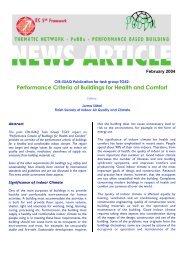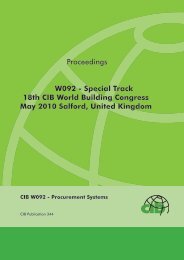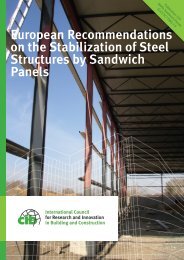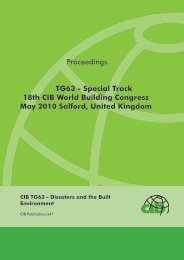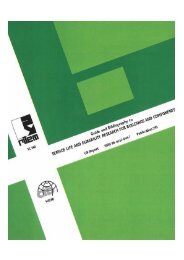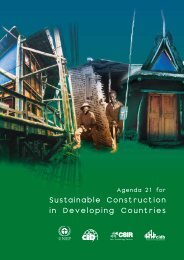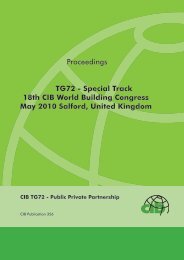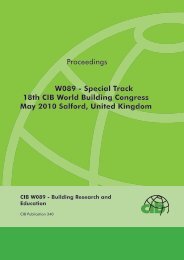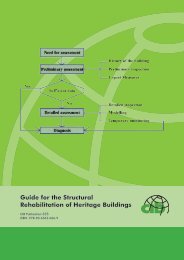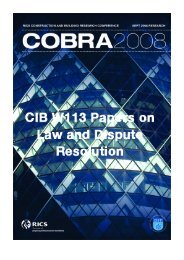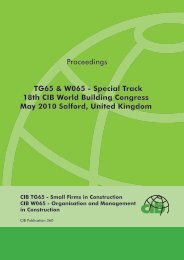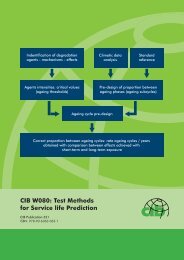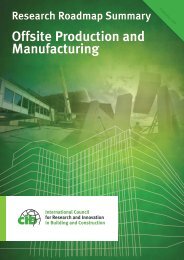- Page 1 and 2: ProceedingsW113 - Special Track18th
- Page 3 and 4: W113‐LAWANDDISPUTERESOLUTIONPAPER
- Page 5 and 6: BreakingThroughBusinessandLegalBarr
- Page 7 and 8: A Review of Key Legislative and Pol
- Page 9 and 10: According to a new report titled
- Page 11 and 12: 1990. That figure has declined to 0
- Page 13: Energy Efficiency Improvement Assis
- Page 17 and 18: well on track for achieving its Kyo
- Page 19 and 20: Multi-objective Decision Making Mod
- Page 21 and 22: understanding the other party‘s p
- Page 23 and 24: Raiffa (1985) and Lax & Sebenius (1
- Page 25 and 26: Table 2: Input Data for Contractor
- Page 27 and 28: 5. Future researchThis paper is dis
- Page 29 and 30: Kuula M, Stam A (2008) ―A win-win
- Page 31 and 32: Dispute Resolution in U.S. Commerci
- Page 33 and 34: 1970’s even though it was not wid
- Page 35 and 36: project which would open the door f
- Page 37 and 38: Questions were then asked about the
- Page 39: There may not be one definitive dis
- Page 42 and 43: 2. What options present the most le
- Page 44 and 45: Technical Building Regulations in E
- Page 46 and 47: systems. Based on information obtai
- Page 48 and 49: Table 2: Who sets the technical bui
- Page 50 and 51: 3) Prescriptive - requirements lay
- Page 52 and 53: Table 7: What were the developments
- Page 54 and 55: Table 9: In which way are national
- Page 56 and 57: 4) Set of coordinated documents wit
- Page 58 and 59: 1. Background of the construction i
- Page 60 and 61: 3. Alternative dispute resolutionOv
- Page 62 and 63: process from arbitration in all res
- Page 64 and 65:
The court held that there was a cle
- Page 66 and 67:
under the contract on the basis of
- Page 68 and 69:
or which the adjudicator may reason
- Page 70 and 71:
proceedings. 49 Other dispute resol
- Page 72 and 73:
Association of Quantity Surveyors C
- Page 74 and 75:
commenced until after the completio
- Page 76 and 77:
34.5(d) the rights and liabilities
- Page 78 and 79:
Appendix CCIDB Standard Form of Con
- Page 80 and 81:
(e)(f)(g)Upon every or any such ref
- Page 82 and 83:
1. IntroductionThe management of a
- Page 84 and 85:
2.2 RM-PBB framework designAll the
- Page 86 and 87:
3.2 Information modelling (element
- Page 88 and 89:
4. ConclusionsThe RM-PBB approach t
- Page 90 and 91:
Meacham, B. J. (2004b). Performance
- Page 92 and 93:
A Challenge to Sustainably Improvin
- Page 94 and 95:
2. Environmental performance of res
- Page 96 and 97:
emissions (Energy Task Force, 2004)
- Page 98 and 99:
NSW and has risen approximately 20%
- Page 100 and 101:
approximately 53% and 46% respectiv
- Page 102 and 103:
The analysis was undertaken on a li
- Page 104 and 105:
Energy Task Force, (2004). Securing
- Page 106 and 107:
1. IntroductionConstruction industr
- Page 108 and 109:
Table 1. Explanation of DFD element
- Page 110 and 111:
Based on the critical review analys
- Page 112 and 113:
Table 4. Results of semi-structure
- Page 114 and 115:
Figure 2. Context Diagram of eDR0DI
- Page 116 and 117:
DISPUTESNew cases (if any)1.0Contra
- Page 118 and 119:
Kassab M, Hipel K and Hegazy T (200
- Page 120 and 121:
1. IntroductionFor a long time, Spa
- Page 122 and 123:
a.- The developer, who takes import
- Page 124 and 125:
Through this description and maybe
- Page 126 and 127:
Finally it must be noted that in ad
- Page 128 and 129:
considers that they are liable, he
- Page 130 and 131:
Vitiating Factors inBuilding Constr
- Page 132 and 133:
the contractor; particularly in rel
- Page 134 and 135:
must act impartially and fairly bet
- Page 136 and 137:
works only within a reasonable time
- Page 138 and 139:
eaches of contract insofar as such
- Page 140 and 141:
ReferencesBakshi, P.M, Construction
- Page 142 and 143:
1. IntroductionProlongation and ext
- Page 144 and 145:
Walter Construction Group Ltd 3 , i
- Page 146 and 147:
date then the contractor is not ent
- Page 148 and 149:
7. Analysing delay claimsMost stand
- Page 150 and 151:
e agreed at the beginning of the co
- Page 152 and 153:
ReferencesAeberli, Peter D, The Wai
- Page 154 and 155:
1. IntroductionContractual and liti
- Page 156 and 157:
provides an overview of dispute res
- Page 158 and 159:
2.1 Court based ADR initiativesSinc
- Page 160 and 161:
assertion of legal rights through l
- Page 162 and 163:
esolution too tortuously indirect a
- Page 164 and 165:
Edwards, Harry T., Alternative Disp
- Page 166 and 167:
1. IntroductionEnvironmental matter
- Page 168 and 169:
2.1 Micro Project interviewsThe ide
- Page 170 and 171:
The lawyers generally felt that cos
- Page 172 and 173:
Breaking through Business and Legal
- Page 174 and 175:
interoperability level has not yet
- Page 176 and 177:
2.2 Observation of the barriers of
- Page 178 and 179:
engineering and quality-control wor
- Page 180 and 181:
States, the BIM Requirements by Sen
- Page 182 and 183:
in order to achieve the benefits of
- Page 184 and 185:
multidisciplinary project team cons
- Page 186 and 187:
the contribution to collaboration m
- Page 188 and 189:
BIM. The fee of the model manager a
- Page 190 and 191:
This paper also concludes that brea
- Page 192 and 193:
Erabuild (2008) Review of the Devel
- Page 194 and 195:
1. Introduction1.1 The focus of the
- Page 196 and 197:
The temperature - the freezing temp
- Page 198 and 199:
planned work sequence contemplated
- Page 200 and 201:
4 Animation examples 124.1 Animatio
- Page 202 and 203:
Animation No. 2 goes further in tha
- Page 204 and 205:
In a construction dispute where mat
- Page 206 and 207:
place in the manner alleged. In thi
- Page 208 and 209:
West Faulkner Associates v London B
- Page 210 and 211:
1. IntroductionConstruction project
- Page 212 and 213:
The growth of mediation presents, a
- Page 214 and 215:
4. Some of the mediations that did
- Page 216 and 217:
The interviewee saw the procedural
- Page 218 and 219:
5. Summary conclusions and recommen
- Page 220 and 221:
Ramsey V., Minogue, A., Jenny, B. a
- Page 222 and 223:
1. IntroductionIt has been stated t
- Page 224 and 225:
2.1.1 The initial programme (IP)The
- Page 226 and 227:
The clause states that the contract
- Page 228 and 229:
to your project in terms of how lon
- Page 230 and 231:
3.2 PersonnelThe implementation of
- Page 232 and 233:
Similar concerns were raised by the
- Page 234 and 235:
Chappell, D., V. Powell-Smith, et a
- Page 236 and 237:
1. Introduction1.1 Building control
- Page 238 and 239:
The earlier development control was
- Page 240 and 241:
Figure 1: First schedule of percent
- Page 242 and 243:
uilding space to control the geogra
- Page 244 and 245:
Figure 4: Safety channel design in
- Page 246 and 247:
2.3 Building control on environment
- Page 248 and 249:
mainly based on streetscape preserv
- Page 250 and 251:
Generally, building control on dome
- Page 252 and 253:
user-based strategy in code making
- Page 254 and 255:
1. IntroductionAn example of a clau
- Page 256 and 257:
to proceed with that degree of prom
- Page 258 and 259:
2.2.2 No explanation by contractor
- Page 260 and 261:
The court in Hometeam agreed with t
- Page 262 and 263:
2.4 Examples of acts constituting f
- Page 264 and 265:
Systems of Building Control in the
- Page 266 and 267:
for energy conservation, save guard
- Page 268 and 269:
quality. Quality management and, ab
- Page 270 and 271:
Figure 1: Energy used (mean LOG) pe
- Page 272 and 273:
Household characteristics and occup
- Page 274 and 275:
PRC Bouwcentrum, 2004, EPC and ener
- Page 276 and 277:
1. IntroductionThis paper considers
- Page 278 and 279:
3.1 ProcessHurtado and O’ Connor
- Page 280 and 281:
factual nature of the relationship
- Page 282 and 283:
interlinked disciplines. A key elem
- Page 284 and 285:
An integrated process in which desi
- Page 286 and 287:
Five LODs are outlined, and these s
- Page 288 and 289:
ConsensusDOCS 301 puts management o
- Page 290 and 291:
http://www.donovanhatem.com/inthene
- Page 292 and 293:
Sawyer, T., 2009a. Leading off with
- Page 294 and 295:
1. IntroductionStrategic waste mana
- Page 296 and 297:
floor of most residential buildings
- Page 298 and 299:
where WASTE i is the amount of recy
- Page 300 and 301:
As far as the control variables are
- Page 302 and 303:
6. Concluding remarksEconomic activ
- Page 304 and 305:
Owens J, Dickerson S and Macintosh
- Page 306 and 307:
1. Introduction1.1 BackgroundRetent
- Page 308 and 309:
clients in the higher education sec
- Page 310 and 311:
4. Analysis and evaluation4.1 Were
- Page 312 and 313:
(Publishers Association Net Book Ag
- Page 314 and 315:
negotiate to attain discounts. In F
- Page 316 and 317:
Champion, R (2005) Do We Need Reten
- Page 318 and 319:
1. Introduction1.1 The issueDuring
- Page 320:
Establishment Act (Vestigingswet),
- Page 323 and 324:
can be produced. In Flanders, a bia
- Page 325 and 326:
strengthen this procedure. Followin
- Page 327 and 328:
ReferencesBranco Pedro, J. F. Meije
- Page 329 and 330:
Modernising Construction Contracts
- Page 331 and 332:
1.3 Construction contracts and draf
- Page 333 and 334:
Economics, 2010): „Simple languag
- Page 335 and 336:
this is to use he or she, his or he
- Page 337 and 338:
virgule or slash (/) but maintainin
- Page 339 and 340:
paper. But that won‟t be easy. Th
- Page 341 and 342:
a reduction of the Contract Sum, wi
- Page 343 and 344:
multiple meanings. It is best avoid
- Page 345 and 346:
In addition, as the NEC3 attempts t
- Page 347 and 348:
ii) dated; andiii) clearly identifi
- Page 349 and 350:
Industry Development Board Malaysia
- Page 351 and 352:
Royal Institution of Chartered Surv
- Page 353 and 354:
1. Introduction1.1 The selection of
- Page 355 and 356:
agencies have some room for discret
- Page 357 and 358:
3. Methods3.1 Research approach and
- Page 359 and 360:
4. ResultsAnalysis of the cases sho
- Page 361 and 362:
to allow the entries that did not m
- Page 363 and 364:
the design of the selection process
- Page 365 and 366:
5. Conclusion and discussionThis pa
- Page 367 and 368:
KAHNEMAN, D. & TVERSKY, A. (1979) P
- Page 369 and 370:
Contractual Issues in the Total Use
- Page 371 and 372:
It is theoretically possible that a
- Page 373 and 374:
According to Hughes and Greenwood (
- Page 375 and 376:
The AIA (American Institute of Arch
- Page 377 and 378:
Latham, Sir M.(1994) Constructing t
- Page 379 and 380:
1. IntroductionAlthough all parties
- Page 381 and 382:
3. Experience of legal professional
- Page 383 and 384:
4. Performance of ADR methodsFigure
- Page 385 and 386:
the expert appraisal process. These
- Page 387 and 388:
professionals and added that it is
- Page 389 and 390:
Framework to further Utilise the Us
- Page 391 and 392:
parties. Thorough process of verifi
- Page 393 and 394:
Adversarial or non-adversarial: sui
- Page 395 and 396:
encourage non-adversarial dispute r
- Page 397 and 398:
1. to save or cut down on expenses;
- Page 399 and 400:
1. Efficient settlement is expected
- Page 401 and 402:
4. A mechanism to further utilise a
- Page 403 and 404:
lawyers since they are normally be
- Page 405 and 406:
5. SummaryAs a result from the anal
- Page 407 and 408:
singtheStandard-Aqualityframeworkfo
- Page 409 and 410:
1. IntroductionIn line with the dev
- Page 411 and 412:
What are the means to quantify the
- Page 413 and 414:
the efforts to understand the reaso
- Page 415 and 416:
Broome and Hayes (1997) in a compar
- Page 417 and 418:
on project success. An essential pa
- Page 419 and 420:
COX, A. & THOMPSON, I. 1998. Contra
- Page 421 and 422:
WALLACE, I. 1996. Construction cont
- Page 423 and 424:
1. Introduction1.1 Background and p
- Page 425 and 426:
Table 2: The status of Urban & envi
- Page 427 and 428:
Table 5: Classification of a union
- Page 429 and 430:
carries out all or part services un
- Page 431 and 432:
Figure 2: Business process modellin
- Page 433 and 434:
Kwon, Seong-woo. Chu, Beom. (2008),
- Page 435 and 436:
construction industry. Legislators
- Page 437 and 438:
egime in each of these jurisdiction
- Page 439 and 440:
embedded in the main body of the pr
- Page 441 and 442:
extraction of oil and natural gas.
- Page 443 and 444:
covers the normal supply of goods c
- Page 445 and 446:
The NSW and NZ modelSection 7(1) of
- Page 447 and 448:
if such a clause is in existence. T
- Page 449 and 450:
not be delayed by any preceding act
- Page 451 and 452:
safeguard the payer or claimant’s
- Page 453 and 454:
may only be exercised in a situatio
- Page 455 and 456:
ReferencesConstable, A. (2006). Con
- Page 457 and 458:
3. Comply with the principles of na
- Page 459 and 460:
Legal Implications of BIM: Model Ow
- Page 461 and 462:
2. Industry issues on legal feasibi
- Page 463 and 464:
ObligationsNew set of skills requir
- Page 465 and 466:
BIM, it is clear that formulation o
- Page 467 and 468:
Aranda-Mena, G., Succar, B., Chevez
- Page 469 and 470:
Reimers, K. (2001). "Standardizing
- Page 471 and 472:
1. IntroductionA new chapter for th
- Page 473 and 474:
3. Mediation: the process, the medi
- Page 475 and 476:
evaluator (“umpire”) depends on
- Page 477 and 478:
Analogously, a spectator is better
- Page 479 and 480:
Fisher, R., and Ury, W. (1991) Gett
- Page 481 and 482:
Cultural Factors Influencing Disput
- Page 483 and 484:
decision making, client-initiated v
- Page 485 and 486:
4. Unqualified and inexperienced ma
- Page 487 and 488:
collective mental programming that
- Page 489 and 490:
3.3 Leadership and CultureA review
- Page 491 and 492:
What are the causes of disputes in
- Page 493 and 494:
26. Fenn P (2007) „„Predicting
- Page 495 and 496:
Change Order Process Behind of FIDI
- Page 497 and 498:
uilding a project. Because construc
- Page 499 and 500:
3. Change order process in standard
- Page 501 and 502:
(http://www.aia.org), (AIA G701-200
- Page 503 and 504:
4. Comparing change order process b
- Page 505 and 506:
4.1 Conclusions and recommendations
- Page 507 and 508:
Public Procurement Law ( KIK) http:
- Page 509 and 510:
1. IntroductionToday, construction
- Page 511 and 512:
Form of Agreement between Owner and
- Page 513 and 514:
documents. It is essential that the
- Page 515 and 516:
3.13. Use of site3.14. Cutting and
- Page 517 and 518:
10.4. Emergencies 9. Protecting and
- Page 519 and 520:
for the special and peculiar requir
- Page 521 and 522:
1. IntroductionAfter stability retu
- Page 523 and 524:
construction industry to look for n
- Page 525 and 526:
Khan (2009) stated that, in conflic
- Page 527 and 528:
Figure 2: Construction Dispute Reso
- Page 529 and 530:
Kuwait‘s construction industry se
- Page 531 and 532:
Brooker, P. 2007, "An investigation
- Page 533 and 534:
A Study on First Hand Residential Q
- Page 535 and 536:
2. Legislation govern the quality o
- Page 537 and 538:
3. Court of First Instance Prudenti
- Page 539 and 540:
1. Allegations of errors made in th
- Page 541 and 542:
Table 1 Summary of the six court ca
- Page 543 and 544:
2000-2008. Despite its small number
- Page 545 and 546:
International Council for Research
- Page 547 and 548:
DISCLAIMERAll rights reserved. No p



